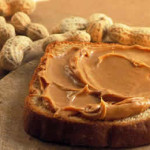Does Peanut Butter Raise Blood Pressure?
The label of ‘butter’ may make you worry because it is typically high in fat and calories that can lead to overweight. And obesity underlines many problems associated with the health of your cardiovascular system, such as hypertension (high blood pressure). How about with peanut butter – does it raise your blood pressure? Though it is a kind of butter that contains some saturated fats, but it is also derived from nutritious nuts. Even many experts consider it as healthy food you should consume moderately in part of a well-balanced diet.
It’s important to have healthy blood pressure (BP) level. When you check your BP with a medical device called sphygmomanometer, the result of test will show you two major numbers given in mm Hg – they are systolic and diastolic pressure.
Diastolic is typically lower than systolic since it points to the pressure inside blood vessels when the heart is not contracting ‘between beats’. On the other hand, systolic is typically considered as top number of your blood pressure since it points to your BP when your heart is pumping the blood or contracting ‘when the heart beats’.
In essence, your BP can rise when the force of blood against the blood vessel wall increases.
As well we know, your body needs to have continuously distribution of blood rich in oxygen and nutrients from the heart to cells of the body. If the blood cannot flow to certain organ of the body, this can lead to a problem. For instance, the blocked blood flow to cells of the brain can cause a serious condition what we call as stroke.
Blood vessels (both arteries and veins) have a significant contribution to support the distribution of blood from the heart to all around the body and then back to the heart. This circulation can be affected by lots of factors. Almost all of these factors can affect your BP – and poor diet is one of these factors.
When it comes to poor diet associated with the increased risk of hypertension, diet high in salt is the most major concern. Other dietary factors are lack of potassium and deficiencies of certain vitamins (especially vitamin D deficiency).
Furthermore, too much consumption of alcohol and diet high in saturated fats are also linked with the increased risk of high blood pressure problem. And peanut butters contain salt and saturated fats – but wait, don’t jump directly to a conclusion about them!
Salt or sodium can retain fluid in your body, this can increase the volume of blood that flow through blood vessels.
Actually, salt is needed by the body particularly your kidneys to hold water to meet the body needs. But excessive sodium in the bloodstream can decrease your kidney’s ability to remove excessive fluid in the blood.
And this can wreck the delicate balance of your blood vessels which then put you at high risk of hypertension.
If you ask about bad fats that can increase the risk of many health problems, saturated fats are the answer.
Excessive amounts of saturated fats can obstruct the way of blood to flow through your arteries. In fact, they play a key role in increasing bad cholesterol (LDL – it stands for low density lipoprotein).
High LDL level in the bloodstream can cause narrowing and hardening artery such as atherosclerosis. And chronic high LDL is a risk factor of hypertension.
Therefore it’s important to restrict dietary saturated fats (especially for hypertensive people – dietary saturated fats should not be more than 6 percent of total calories, according to the last guideline of DASH diet ‘the Dietary Approaches to Stop Hypertension’).
As mentioned above, peanut butter contains some salts and saturated fats. And now you know well that they are not good for your BP. But you should also understand that foods with both properties are not always considered as unhealthy food. It’s dependent on the level of each property.
Fortunately, the amounts of unsaturated fats (healthy fat) in peanut butter are relatively much higher than its saturated fats. Moreover, it also contains other essential nutrients for the body.
 These reasons may be the answer for why some numerous researches showed that participants with well-balanced diet along with the moderately consumption of nuts and peanut butters were less likely to develop type-2 diabetes or cardiovascular diseases than other participants who rarely consumed nuts.
These reasons may be the answer for why some numerous researches showed that participants with well-balanced diet along with the moderately consumption of nuts and peanut butters were less likely to develop type-2 diabetes or cardiovascular diseases than other participants who rarely consumed nuts.
Seeds, legumes, and nuts are recommended in DASH diet – and peanut butter can be one of your alternative choices to expand the flavor. A DASH diet meal plan can include at least 4-5 servings a week for nuts, legumes, or seeds.
… Keep reading!



